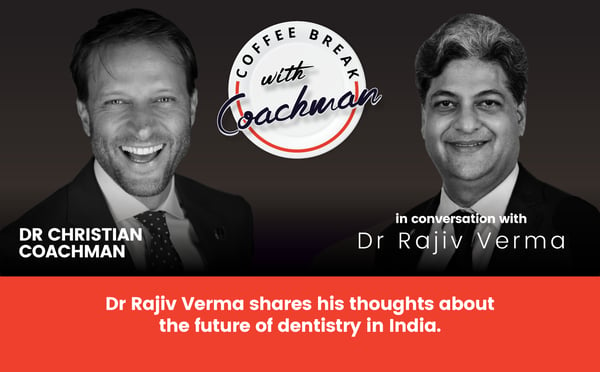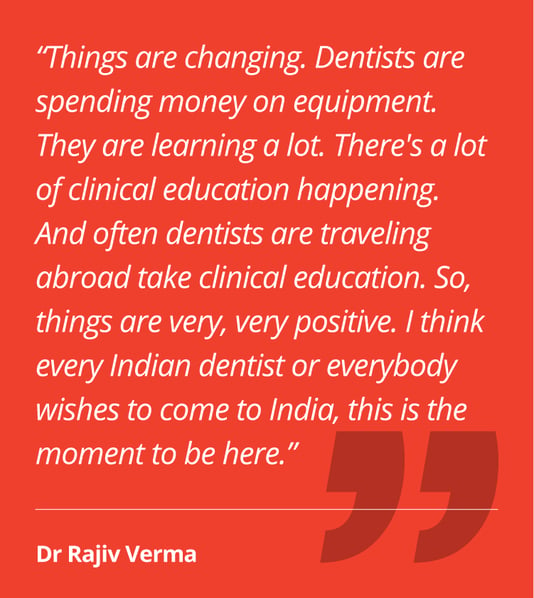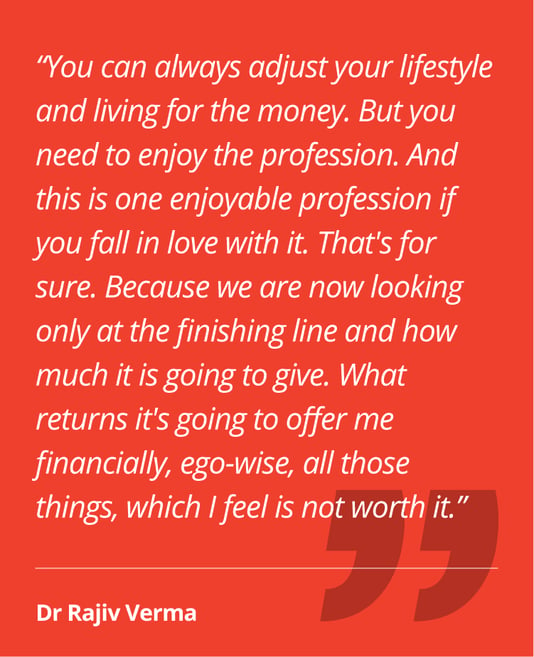Christian Coachman in conversation with Dr Rajiv Verma, Part 2
What follows is an interview with my dear friend, Professor Rajiv Verma from Mumbai, India. He is one of the most renowned dentists, professors, in that country, in one of the biggest countries in the world, one of the most exciting countries in the world. I wanted to talk to Dr Verma about what the future is for dentistry in India.
Click here to watch the Coffee Break with Christian Coachman - Episode 5 part 1 with Dr Rajiv Verma
This interview was originally taken from Coffee Break With Coachman, a series of interviews with the best dental brains and the best personalities, in short, the most influential people in our dental industry today. From business to marketing to clinical to research, academics, laboratory technology and digital, each of the interviews is a conversation with a thought leader in their field, sharing their knowledge and experiences.

RAJIV: Considering all the foreign companies coming into India - they know the Indian economy is growing. The market is huge, except for the Indian dentist. Dentists I meet who understand this business part of dentistry are worried about standing on their own two feet and starting a family. But the implant market is huge here. All the digital impressions and scanning systems presently are like hotcakes in India. For dentists I'm meeting from big cities they are buying it. So, things are changing. Dentists are spending money on equipment. They are learning a lot. There's a lot of clinical education happening. And often dentists are traveling abroad take clinical education. So, things are very, very positive. I think every Indian dentist or everybody wishes to come to India, this is the moment to be here.

CHRISTIAN: What about corporate dentistry? Do you have in India chains of clinics?
RAJIV: Now you’ve hit the bullet.
The young generation is troubled by the corporate world so much, and the biggest law in India, that dentists cannot advertise because we are professionals, but corporate industry, because they're a private limited company, can market and advertise. So, there are chains in India which are huge. They are trouble for the dentists, no doubt.
CHRISTIAN: So, a private dentist practitioner cannot advertise his work. By law?
RAJIV: He cannot put anything in a newspaper, an advertorial. He cannot have a hoarding. Social media digital marketing happens, of course. But what is in the eyes of the patient are these big hoardings by the corporate practices and advertisements in airline magazines. So, these are places where you find them. But, of course, they will always come and we need to grow ourselves. We need to learn new things like I learned Digital Smile Design at this age, and we need to update ourselves. There will never be a competition to us. That's most important. Unless you decide to join. They are swallowing practices in India. They are approaching us and they are saying, "We will buy your practice."
CHRISTIAN: Yes. And it's going to happen. And as I always say, it's not that corporate dentistry is bad. It's just going to happen anyway. They will learn.
Corporate dentistry and the companies will learn how to do good dentistry. There's this prejudice against them, but this will change, as well, as they bring modern concepts of management and quality control and modern procedures. They will hire young dentists, good dentists. They will hire good treatment planners.
So, I believe there's a whole new world for young dentists to work for these corporations. Like in any other industry, this will become one of the main jobs. You graduate, and then you go work for companies that are delivering good dentistry.
RAJIV: It's already happening in the medical world, in medical hospitals.
Dentistry will mature eventually in that area.
CHRISTIAN: I always, when I analyze, try to analyze a country in terms of business, one of the things that I always ask is how Invisalign is doing in the country because it's a highly digitalized, very modern company with a great concept, a great product, but the country needs to be ready to accept digital dentistry, digital orthodontics and all these changes. So, for example, in Brazil it took a while for Invisalign to start to grow, and now we see it. Last year, there was a huge growth of Invisalign in Brazil meaning that Brazil dentistry and dentists in Brazil are finally ready to give value to the digital world flow. So, how is Invisalign doing in India?
RAJIV: I guess by following Brazil in every way. Invisalign, every orthodontist I meet. Invisalign in India is licensed only to orthodontists. So, almost everybody's doing it. Even recently a private chain from the U.K., My Smile, was in collaboration with Invisalign, and has entered India as the corporate entity. It’s picked up a lot, no doubt. And I'm sure next year, 2020, would be in there same as Brazil is for you today. So, it would be every orthodontist would have it.
CHRISTIAN: So, I usually use that as an indication that the country is ready for new technologies. And, again, it's a mindset.
When we see Invisalign starting in the country, the first thing you see is the community of orthodontists saying that it doesn't work and not even being worried about it. Then starts to pick up, and then the ortho community starts to attack it.
Instead of not being worried, they start to really attack and go against this movement. Nothing against the orthodontists. It's just an example. It happens in every area. The same way that restorative dentists attacked internal scanners saying it didn't work, and then you start to get uncomfortable with the new technology because you don't want to embrace because of the comfort zone and the learning curve. But then other guys starts to use that technology, and then you have to make a decision.
Get away from your comfort zone and embrace it or criticize and say it doesn't work.
So, then when you move into this critical moment criticizing the new trend, the new technology, all the way that new technology beats the criticism, and then suddenly people have to start giving up and embracing it. So, we see that happening in Brazil and, as you said, in India, as well.
The moment that you see the top orthodontists saying, "Yeah, I do Invisalign, as well," you see that something changed drastically. And then the next step is when you see top orthodontists saying, "I only do Invisalign." That's the highest level. "I only do Invisalign." So, that's the normal path, and we see major aligner societies, aligner academies opening. Actually, today I believe, today starts in U.S. the first day of the first congress of the first American Aligner Society. Our team is there. We have the first aligner society in Brazil founded a couple months ago with their first event to be organized. This year, even though I'm not an orthodontist, I lectured to some big orthodontic meetings only focused on aligners. Extremely serious, well organized, amazing professionals, great publications really taking that technology seriously, that 10 years ago was almost like a joke. I remember talking about aligners 10 years ago, and people would laugh at it, say, "No. This is just for amateurs."
And suddenly you see how it became something super serious. So, it's very interesting and nice to see that India is going on the same path. Do you have an aligner society in India?
RAJIV: As of now no, I don't think so. It's the Indian Orthodontic Society which it falls under, but I'm sure this will happen in the next few months. That's 100% sure. And I'm sure it will also happen with your DSD. I remember when nine years ago, when you started with the DSD concept, you were also criticized. Here comes a young man from Brazil, who draws a few lines on the face and says I am the next smile designer of the world.
Well, Christian, I can tell you those lines changed my life forever, and to understand that, you need to be a dentist and you need to be a technician. If you are both, you understand this instantly.
CHRISTIAN: I think that's a balance that we need to all understand. We cannot jump and embrace everything that is new because we know that most of the new ideas end up not working. So, of course, we need to have a filter, but what I see is that, again, when we are analyzing new ideas, new trends, we need to put our ego aside. But the ego comes in, and the ego makes you defensive and makes you criticize the new idea. Not because you are analyzing in-depth the idea, but because it was not your idea or because it's taking you from your comfort zone or because it pushes you, a well-known dentist, into a learning curve again, and you say I already know everything. I don't need to re-learn how to do dentistry. And that makes you defensive and makes you criticize things that will become the norm in the near future.
So, we need to be open to change. We need to have a filter.
We need to have a filter, but we need the balance. We need to be smart to embrace and not criticize. But that's human nature, right? As we know, new ideas always go through that path, and I remember, as you said when I started talking about DSD, like nine years ago, I said that in the future only an iPhone would be enough to document the whole case.
People wanted to kill me seven years ago, when I started to tell the world that layering ceramics would disappear. When I mentioned about the virtual simulation and integration between DSD and aligners, again, people wanted to …
So, the interesting thing is that the same way that people told Steve Jobs that home computers will never work, the same way that smart people 100 years ago said, "Look, automobiles are very cool, but there's no reason why I would change my horse for a car." So, human beings, smart human beings said that. And they say it over and over again. And so we just need to be careful with what we say, with our statements and our beliefs because we always change. Right? We always change.
And I think when I talk about ego, I always mention Indian culture, because I'm sure there's egos there, but naturally somehow Indian culture and Indian spirituality is focused on controlling the ego. You guys naturally have this humbleness, even if you guys are at the top of your career, you guys just are genuinely humble. It's amazing. And I don't know if that comes from meditation, from yoga, from the inspiration of Buddha or where this humble feeling comes from.
RAJIV: It would be two answers. One answer could be, of course, as my wife, she mediates and all that brings her into all these kinds of feelings. As you said the Buddha, there are in our Hindu culture, although India is a multi-country, a multi-religion. Hindus, Muslims. You find everybody in this country living happily together. So, together the amount of gods we have. But I think the basic humbleness, which we, at least in my generation, we have because we have a joined family concept earlier. So, you had your parents staying with you. You became a dentist. You're staying with them, your grandchildren.
Everybody's webbed together, though it is disintegrating into a nuclear family now for sure. But I think you start by respecting the elders, you start by respecting the young child in your house, and things just come from that. And it's natural. You said it, I think. It's natural. It's natural to many, many Indians.
CHRISTIAN: And it's also natural in your culture to understand how to be happy with whatever you have. I know that western culture is coming in and changing this a little bit, but culturally in India you can walk on the street and see the poorest people on Earth, but many of them you can see a genuine happiness with whatever situation they're living. That creates peace of mind, deep, profound, complete piece of mind. And it was an amazing learning experience for me to learn from you guys that you need to be at peace with whatever you have.
RAJIV: Most important because otherwise that race is never finished. Frankly, you are alone in the race. You are not racing with anybody, so it's pointless. In the journey, for all young dentist across the globe, though I am also younger, 56, dentistry's a long stand from 25 years of age to probably 65 years. That's 40 years. We just need to keep walking. The mistake what I did was running. And the running killed me. I just needed to keep walking. Maybe if I change my pace of walking, the journey will be absolutely beautiful. Because how much you earn at the end of the day, it doesn't make it.
You can always adjust your lifestyle and living for the money. But you need to enjoy the profession. And this is one enjoyable profession if you fall in love with it. That's for sure. Because we are now looking only at the finishing line and how much it is going to give. What returns it's going to offer me financially, ego-wise, all those things, which I feel is not worth it.

CHRISTIAN: Amazing lesson. I knew that our interview was going to be special. You mention many times also because of your humble personality, even though you are an amazing professional and recognized all over, you are so humble and so genuine. And you mention my name many times saying how much you learn from me, but I can tell you at an equal level or, even though you may not believe, I believe I learn more from you than you learn from me, and from your family, from your wife, special spirit. Your wife, special person. So, it's a great honor for me to call you a friend. For me this was a special interview, and I was very happy that we ended with this spiritual message because I think that's the most important of all. And nobody better than you and your country to give to the world a new vision of how to be in peace and how to create a better for all of us. So, I want to thank you again for your time. I hope that many, many students will listen to all this interview. I hope many old doctors and already successful doctors will also enjoy this interview because I think we need to.
I hope you enjoyed this interview with Dr Rajiv Verma and were inspired, as I was, to continue to learn and grow as a dentist, and to stick with things, even if they seem tough.
If you would like to know more about Digital Smile Design, the DSD Planning Center and the courses we offer, including our four day residency to take the first step to becoming a DSD Master, find out more here:


